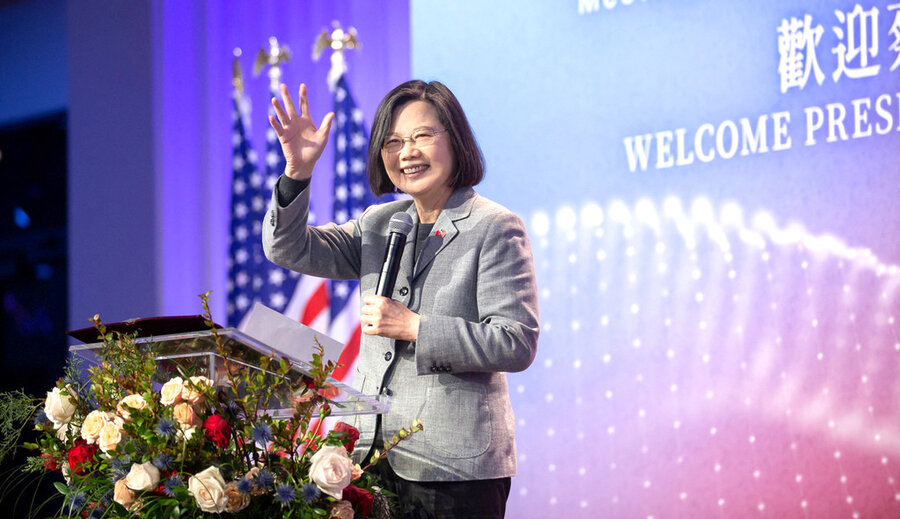A truth-bearing defense against China
Loading...
The president of Taiwan, Tsai Ing-wen, made a rare visit to the United States on Thursday and delivered this message in a speech: Her island nation’s democratic values are in peril from authoritarian “belligerence.” China, in other words, is challenging Taiwan from within – using disinformation and misinformation to undercut values such as freedom and rule of law – even more than by threatening a military invasion.
Her words were timely. At this week’s second Summit for Democracy of some 120 countries, much of the discussion was on ways to counter what Ms. Tsai calls “cognitive warfare” on the internet. The first summit was held in 2021 before Russia’s war in Ukraine. Since then, that war has shown how the resiliency of Ukrainians in rebutting Russian digital propaganda with transparency and accurate information can help their war effort. As U.S. Secretary of State Antony Blinken said at the summit, democracies must deal with disinformation and misinformation in a way “that brings truth to bear.”
Taiwan, which holds a presidential election early next year, feels some urgency to improve its democratic shield against China. A year ago, the Chinese military issued a new doctrine that said warfare “depends mainly on information to subdue an enemy.” Ms. Tsai has set up a ministry for digital affairs as well as a national institute of cybersecurity. She also plans to set up low-Earth-orbit satellite internet service in case China cuts undersea cables.
Yet Taiwan’s real strength against Chinese propaganda lies in its citizen-led fact-checking groups, such as MyGoPen, Cofacts, and Taiwan FactCheck Center, that correct false information online or in the news media.
“These organizations form a collaborative safety net to shield Taiwan’s unique information space and vulnerable democracy,” write scholars Chiaoning Su and Wei-Ping Li in Taiwan Insight. “Taiwan’s fact-checking practices offer a timely and fitting lesson as China becomes increasingly bold in its cyber intrusions.”
In addition, Taiwan uses Polis, an online discussion platform, to allow its citizens to weigh in on public topics. “The idea is that if everyone is talking in a reasonable way, according to transparent rules of online debate, then conspiracy theories don’t spread so quickly,” reports The Atlantic magazine.
The nation’s digital minister, Audrey Tang, describes the strategy as “official resilience for all.” The power of collective intelligence at work in digital public spaces helps reinforce cohesion and collaboration.
“We can empower the voices reaching across ideological divides and uncover our shared values in plain sight,” she said in a video at the summit. For Taiwan, those values may mean less peril from a belligerent foe across the Taiwan Strait.







